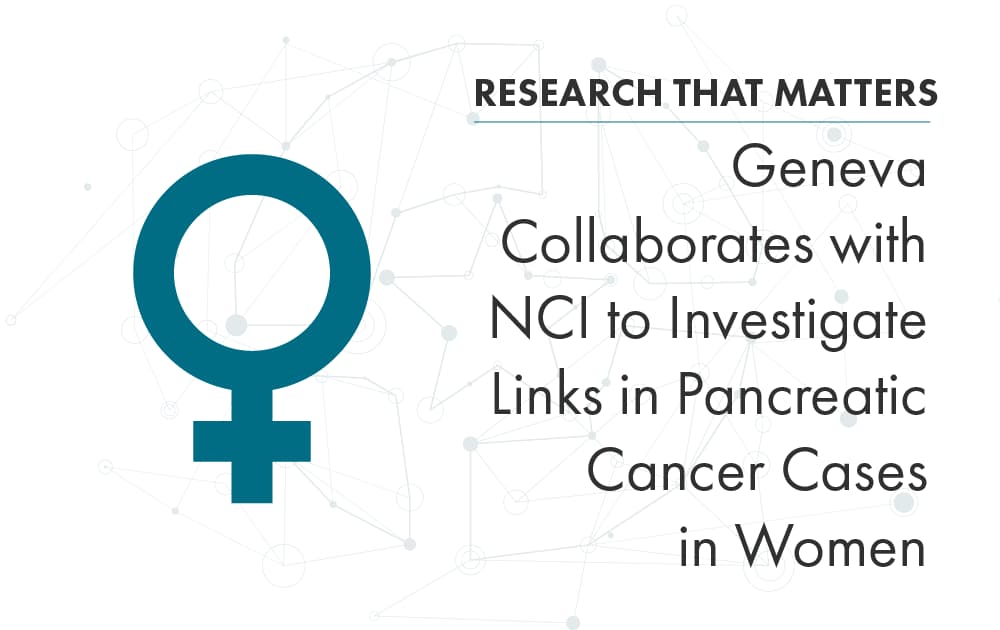14 November 2022
Geneva Collaborates with National Cancer Institute to Investigate Links in Pancreatic Cancer Cases Among Women
The number of people diagnosed with pancreatic cancer has been growing the past two decades for men and women. Now accounting for 3% of all cancers in the United States, it is the third deadliest type of cancer, causing 49,830 deaths annually.
Identifying new trends, diagnosing the disease earlier, and finding effective treatments are key goals of researchers because the disease is particularly aggressive and unresponsive to most treatments. Pancreatic cancer presents as advanced disease in greater than 80% of patients.
Principal Investigator Rachel Stolzenberg-Solomon, PhD, MPH, RD is leading a study titled “Lipidomics and Metabolomic Profiles and Pancreatic Cancer Risk in Women’s Health Initiative Participants.” Dr. Stolzenberg-Solomon is a Senior Investigator at the National Cancer Institute, part of the National Institutes of Health. Geneva serves as the contracting organization for the study’s research team.
Dr. Stolzenberg-Solomon has focused much of her research on elucidating the etiology of pancreatic cancer. She has examined dietary, other lifestyle, and genetic factors, including biomarkers related to insulin resistance and metabolomics that may help reveal underlying mechanisms of carcinogenesis. In addition to her work in pancreatic cancer research, she also studies other nutrition-related hypotheses including biomarkers in nutritional intervention studies. She has published over 225 manuscripts in these areas.
Pancreatic ductal adenocarcinoma (PDAC) is the most common type of pancreatic cancer, accounting for 90% of pancreatic cancer cases. Known risk factors for PDAC include smoking, being overweight or obese, having diabetes or chronic pancreatitis, and a family history of pancreatic cancer. Heavy alcohol drinking and poor dietary quality might also be associated with the cancer.
Epidemiological studies using lipidomic and metabolomic approaches can identify lipids and metabolites associated with exposures and diseases. Dr. Stolzenberg-Solomon hypothesizes that unique metabolites, metabolomic profiles, and lipid species will be prospectively associated with PDAC, including those related to subclinical disease and diabetes.
Using pre-diagnostic blood samples from the Women’s Health Initiative, a landmark national study funded in 1992 by the National Heart, Lung, and Blood Institute (NHLBI), the data will be incidence-density sampled and matched to cases by randomization and observational study arm, date of birth, age at baseline, race, and season and year of blood draw.
“This research has the potential for meaningful advancement in understanding the systemic biology and mechanisms of pancreatic carcinogenesis that may be applied to prevention, “said Dr. Stolzenberg-Solomon. “The impact of this research in the short-term is that in combination with known pancreatic cancer risk factors, the metabolites and lipids identified may be useful in identifying groups of individuals at higher risk for pancreatic cancer.”
This award is funded by the U.S. Army Medical Research Acquisition Activity (USAMRAA)/Congressionally Directed Medical Research Programs (CDMRP) under award number W81XWH-22-1-1019.
Disclaimer: The views expressed do not reflect the official policy of the U.S. Army, the Department of Defense or the U.S. Government.

"This research has the potential for meaningful advancement in understanding the systemic biology and mechanisms of pancreatic carcinogenesis that may be applied to prevention."
Dr. Rachel Stolzenberg-Solomon
HIGHLIGHTS
- Pancreatic cancer is the third deadliest type of cancer, causing 49,830 deaths annually and its incidence is rising among men and women.
- Principal Investigator Dr. Rachel Stolzenberg-Solomon of the National Cancer Institute is leading a study titled “Lipidomics and Metabolomic Profiles and Pancreatic Cancer Risk in Women's Health Initiative Participants” using pre-diagnostic blood samples from the Women’s Health Initiative.
- Dr. Stolzenberg-Solomon hypothesizes that unique metabolites, metabolomic profiles, and lipid species will be prospectively associated with pancreatic cancer, including those related to subclinical disease and diabetes.


